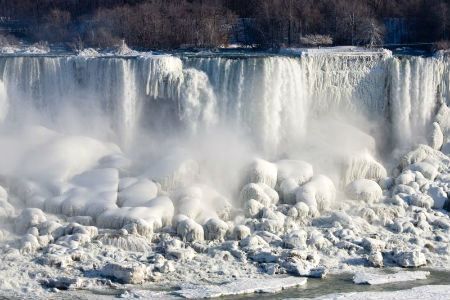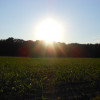Is This the Results of “Global Warming”?

If you have been watching the Weather Channel or your local weather station; you will realize that some of us have been experiencing phenomenal weather conditions. I heard that the wind chill factor in one city was 74- which is basically unheard of in the lower 48 states. It seems as if every winter is getting colder and every summer is getting hotter!
Can this be due in part to Global Warming? Remember the movie “The Day After Tomorrow”?I do remember the film. Climate change happened a little too quickly in it, I thought. However, I remember bouts of the weather USA is having now in the 1970s and the 1990s as well as today. - Every 20 years maybe. Going back, same kinds of weather happened in the 1950s and there are pictures of that on the Internet. One summer in the 1960s, I remember it snowed briefly in August and hailed golf-ball sized hailstones in July.
I hope the cold weather events compress into a few weeks of January and February 2015 and disappear!It does seem though that these "bouts" are coming more often (to me, that is.) The ability to forecast and document phenomenal occurrences is far more advance than 50 years ago. A lot of information may have gone unreported.
That's true -- We noticed a big change and more advanced methods in weather forecasting in the 1970s in Ohio.
There's a possible link, actually, though it's uncertain at this point.
We've seen these cold outbreaks over the past several winters, sometimes here and sometimes elsewhere (IIRC, last winter it was western Europe.) It's regional, not global or hemispheric; see for example today's "Climate Reanalyzer" which shows the intense cold over much of eastern North America accompanied by a warm Arctic and large chunks of Asia and Europe.
http://cci-reanalyzer.org/DailySummary/
(Note to later readers: this link will update, so you may see something different.)
These patterns are the result of cold Arctic air masses coming south over large areas.
There is a theory that this may be more likely with climate change. The general idea is that the Arctic is warming faster than lower latitudes. That means that the difference in temperature lessens. But it's that difference that helps power the jet stream, so the jet stream tends to weaken. When it does, it 'wanders' more, which can steer those cold air masses farther south than usual (and conversely, let more warm air into the Arctic.)
It's not an accepted theory, by any means, but they are working away to figure out if it is correct or not. Here's a pretty good story on it from last February:
http://www.npr.org/blogs/thetwo-way/201 … se-its-wayThat is a sound scientific theory ... thanks for that comment. WOW, are you a meteorologist?
Thanks, Jacqueline. No, I'm a musician by training, but I've been studying the whole climate change issue for years now. Call me a 'concerned citizen.' I've written Hubs on a lot of what I've found out about the history of the science involved, like this one:
http://doc-snow.hubpages.com/hub/Global … rles-WellsAlthough I only glanced through your article; it seems to be an extraordinary read. I will need to devote more time to the content (it is relatively long :-) ) but nevertheless, I will attempt to plow through. I am fascinated about the subjects of climatology and things concerning the natural environment. Animals in the wild ... plants ... things of that caliber. Thanks for the link.
P.S. These are some great links. I watch only two channels: The Weather Channel & National GeoWild and you are as interesting as either! Again, great info!
Somehow I doubt this. There have been winters just as cold before, and summers just as hot. The weather conditions, if you look towards the past, aren't nearly as phenomenal as you might believe.
It could still be possible that it has been going on for decades. I am sure that its not going to be an all of a sudden event. It took years for certain species of animals to become extinct but it happened.
I agree with you. 'Global Warming' is a myth. The Poles may be shifting. If they are, then we have an explanation why, for example, Georgia is experiencing New York weather, or England is experiencing Norway whether.
If the 'north pole' is now in Iceland, for example, then the 'artic circle' extends into Canada and Northern Europe and where the area called the Arctic would be somewhere in the Russian Tundra.
This is just a theory, as valid as any other.I do prefer the terminology "theory" to "myth" as it does sound more scientific. I have always when fascinated with "Global Warming." As to whether there is any real data to substantiate it is still very debatable. One thing for certain ... time will tell.
There are people who refuse to believe that we actually landed a man on the moon. Some consider this a "myth." There are others who do not see the correlation of the phases of the moon and how it impacts human behavior. That is considered a "myth" as well. Unfortunately, there will always be people who don't believe in anything :-) However, that doesn't make it not true because someone doesn't believe it.Let me a bit more explanatory; I don't know if a man landed on the moon. But I do know it is NOT warmer today. In Fact it is Colder than I can remember. When I look at photos of NY or Chicago or Birmingham, it looks like Alaska in the winter.
To have a huge population believing the Earth is getting hotter, when in fact anyone who can feel or see or hear must appreciate that it is getting colder...well 1984 is surely here.
Global Warming is not a religion, it is not a belief. It is either true or false. Is it Raining in Miami? No one has to believe or disbelieve. One is there, and can walk outside and see if they get wet. One is not there and can bring up any of a number of weather channels to prove/disprove.
Global Warming has been disproven every single year since the media mouths first mentioned it. They lie about 2014 being the 'warmest' year ever; which is pure crap.
You don't have to go back to Stegasaurus to find warmer times, crack your Bible. Outside of Job [who was up in the mountains of Iran] everyone else wears sandals. The Romans ran around half naked. You ever see a pair of Roman Pants? You want to try wearing one of those uniforms in Jerusalem today?
The Earth is not getting Warmer. It's just a diversion. Just something to have us all look yonder.Please don't get your feathers flustered. That was certainly not my objective! I like this definition that I read with regards to "Global Warming ..."
"Global warming is not really a good description.
The warming is located at the north and south poles where the ozone layer has been destroyed by Co2 and other pollutants. It is causing the Ice Caps/Glaciers to melt and break off into the ocean just recently a piece the size of Vermont broke away and drifted to within 2000 miles of the equator before it melted now all that ice from the polar caps is fresh water from glaciers, as it melts it screws up the salinity of the oceans and causes the waters to cool at a much faster rate than salt water and with that the gulf streams rate of flow change. it is said that both the pacific and Atlantic gulf streams have picked up in rate by about 1 to 2 knots in speed that means that the cooler water from the poles flow further south or north depending on which hemisphere before they warm up. now as far as the severity of the tropical storms go the cooler water now gets heated at a faster rate and produces greater instability when the vapor from evaporation rises into the atmosphere.
So you see that yes global warming (Polar Heating) is creating some very serious problems. "Well, in fact, one *can't* feel whether or not the globe is warming or cooling, since each of us can only be in one place at one time. And even our ability to tell whether or not that one place is warming or cooling is limited by the statistical 'noise' of large (but normal) changes in the weather.
To tell whether the globe is warming or not takes actual measurement, carried out over a wide variety of places and over a sufficiently long period of time. There are different programs doing that today.
1) Maybe the best is the US National Climate and Data Center, in North Carolina. They combine thermometer measurements from all around the world and calculate a global mean temperature for all years as far back as 1880. Here's what they say: "The global annual temperature has increased at an average rate of 0.06°C (0.11°F) per decade since 1880 and at an average rate of 0.16°C (0.28°F) per decade since 1970." http://www.ncdc.noaa.gov/sotc/global/2013/13
2) Also American is GISTEMP, a project of NASA's Goddard Institute of Space Studies. Using a slightly different method, they find a basically similar result. Here's what their record looks like on a graph: http://data.giss.nasa.gov/gistemp/graphs_v3/Fig.A2.gif
That's about 0.066 C per decade since 1880.
3) The British have HADCRUT, also combining thermometer readings around the world, which finds a very similar result: http://www.cru.uea.ac.uk/cru/data/tempe … dCRUT4.pdf
Their record goes back to 1850, and since there wasn't much warming in the early part of it, that works out only to about 0.047 C per decade.
I see that they have already incorporated the 2014 data in, showing it to have been the warmest year so far in the HADCRUT record.
4) Another approach is to use microwave sensors on satellites to infer temperature. One program to do this is at the University of Alabama, Huntsville (UAH.) They are here: http://nsstc.uah.edu/climate/
Since there were no satellites doing this before 1979, that is when their record starts. But the warming trend since then is 0.13 C per decade, according to their numbers.
5) Another outfit, RSS, uses the same satellites but a different method: http://www.remss.com/research/climate
And, yes, they too find a warming, amounting to 0.12 C per decade.
Lastly, a whole new thermometer-based approach was used more recently to come up with yet another, completely independent estimate of the warming. (Some folks developing it were concerned that maybe there could be problems with the other 5 sets I've mentioned.) Here's their site: http://berkeleyearth.org/summary-of-findings
Their numbers include estimates all the way back to 1750, though with wider uncertainties for the older years. And what is the bottom line for their trend? Why, 0.06 C per year, since 1800.
Now, anyone who wants to insist that ALL these folks are lying, is certainly free to do so. But I don't believe that for one second.That's quite a range of numbers, differing by a factor of more than 10. From .06C per year to .047C per decade.
There is also the question of whether it is statistically significant; an increase of a couple of degrees in one year will produce the figures seen.No. But it's my fault; the only "per year"--the one for BEST--should be "per decade." The trends are all in pretty reasonable agreement.
And yes, the trends are highly significant. (That's been shown multiple times.) To lose statistical significance, you have to start with 1997 or so.
No, climate change is not a myth.
And no, not all theories are equal. They must submit to the test of actual evidence. And, despite what some would have you believe, today's mainstream science on climate change aces that test.
- FatFreddysCatposted 10 years ago
0
That movie was absolutely hilarious. The problem is, it wasn't supposed to be a comedy.
I really didn't see the humor in it but then some people seem to find humor in a lot of things. I've always been a "what if" type of person so to me it was very enjoyable.
There is ZERO humor in the science fact presented in "The Day After Tomorrow".
What I will never understand is why some people are hell-bent on denying science---particularly climate science and equally hell-bent on not considering the "what if" scenarios.I totally agree with you on that point. There was nothing funny about people freezing to death or being bombarded by hail. I will forever not only be concern about the climate but respect the fact that its something that can't be ignored.
And...I can't help but recall the satellite images from the film which are all too close to what we're seeing on satellite images available today on any given weather information outlet.
And, like the movie ... there were a hand full of people who wanted to warn everyone of the impending danger but was shrouded off by bureaucracy.
There has to be something going on, but I won't pretend to be educated enough to fully understand what. I live in South Carolina. In this part of the state the normal low in January is around 32-35 degrees F. Today it was 11. That is NOT normal. Even more abnormal is the fact that we are suppose to have multiple days like this. Our climate IS changing. Why? Again I have no idea!
I agree with you completely. To be perfectly honest ... I don't know why either. Back in the 50's everything was blamed on Nuclear Testing. We are still looking for logical reasons for nature's unpredictability.
In my country Indonesia which only have two seasons: Dry season and Rainy season, it becomes irregular now. It means, not sure when the dry season comes, and so does the rainy season. It confuses the farmer.
Yes. And being unsure when to plant isn't a good thing for a farmer! In North America, there are 'hardiness zones'--basically a map showing norms for farmers and gardeners. A few years ago, the US had to revise theirs, basically shifting zones north one whole zone. The growing season has lengthened significantly--but may, like your rainy season, have grown less predictable.
A friend of told me that the colder winters are because of global warming. Either way I want to move south for the winter.
I live in the South and its worse because we can't get used to the cool weather. Even when it's just for a few days.
That would be frustrating. At least I'm expected to have cold weather in New York. Maybe I need to go more south than you.
Even Florida gets bouts of cold weather every now and then. But I suppose maybe Mexico? I still think I prefer my part of the country as oppose the your part. Gee, I don't think I could handle that much snow! :-)
What is very telling is the preponderance of weather anomalies like tornadoes in Los Angeles, snow in Miami, hurricane-force winds in Buffalo, etc. None of this is typical, but all is symptomatic of climate change.
Many mortgage holders will require flood insurance based on a "hundred year" data set. If you live in an area that might see a flood in 100 years you will be required to purchase insurance.
This is because non-typical weather is the norm when the time period is long enough. Miami snow, for example is to be expected if the time frame is long enough, as is a tornado in LA. It is actually typical and expected if we use a long enough view, and saying that such things haven't happened for a decade (or many decades) is not symptomatic of anything but a short sighted viewpoint.
Even the slow warming the globe is seeing on the average is not abnormal if we look back a few million years at average temperatures. It happens, and thinking that our extremely short existence on earth is the norm for the planet is a mistake.
- Mary Buggie-Huntposted 10 years ago
0
Sadly, globally we are seeing plenty of climate change (resulting from global warming) including sustained cold temperatures in areas of the world (including the U.S.) where sustained cold is not part of the regional weather history or climate---like the U.S. southern tier.
Even in the northern tier of the U.S. we are feeling the effects of climate change including frequent high winds and extreme snowfall. Record cold and record snowfall (repeated events) are persistent in the north this winter.
And yes, you are right to point out "The Day After Tomorrow". Sometimes I worry that we are already there.Just a matter of time ... if we keep ignoring the signs.
Exactly.
I just can't wrap my head around the climate science deniers. It makes no sense at all to refuse to accept the fact that human activity is stressing the earth and that it can't tolerate continued and growing stressors.You will always have people who like the Ostrich ... bury their heads in the "sand of ignorance" until it becomes obvious to everyone. But by that time it is much too late to do anything about it. We can only hope that "those in charge" will begin to recognize the warning signs.
Welcome back mbuggieh. I do recall you used to get quite animated in the forums. Good to see you again.
There is a difference between weather and climate.
We have seen really cold temperatures around the world, but that doesn't change the fact that the oceans are getting warmer and are rising, Miami may soon be under water.
I think humans have a lot to do with climate change. We have polluted the air, water, and killed off many trees, plants and animals. Yet the Earth is getting older too, and it may just be time for it to change. I believe we are in more danger of being without clean water or food than we are in danger from nuclear war.
Science has proven that the Earth is a lot more than 6,000 years old though, so some people need to stop the nonsense and accept the facts we do have. I also have read that the poles may be shifting.You stated in your first sentence that there is a difference between weather and climate. Let us explore that concept; shall we? Now as far as time frames are concerned which last longer a change in the weather or a change in climate? Also what are the long range implications of the two/
Weather is what a small locale sees, either today or (as in the farmers almanac) for a year or so. Climate is what a large geographical area, maybe the SW US, sees, and when considering climate change, over centuries.
So, weather involves locality and climate involves a larger geographic area. I see. So, the jet stream, when it dips down into the southern region bring with it artic air has an influence on the weather and not climate change, is that right?
By definition, climate is the long-term average of weather conditions, including normal seasonal shifts. For example, here is the statement from the US National Climate Data Center:
So a 'shift in the weather' is by definition pretty much a short-term thing, active for no more that a season, or (as in the case of something like the drought seen over the last few years in the American west, especially California) at most a few years. A 'shift in climate' is something that affects the long-term average weather conditions--like those 30-year normals, for instance. Climate change can be *very* long-term indeed, whether we are talking about natural climate changes, such as succession of glaciations experienced over the last few million years, or human-caused changes such as the warming we are now observing. Dr. David Archer of the University of Chicago states in his book, "The Long Thaw," that the effects of the current 'slug' of atmospheric carbon will be discernible in Earth's climate for 100 millennia into the future, before natural mechanisms fully 'resequester' the carbon we've released.So ... if we experience a change in climate ... then we are talking about long term implications. The weather changes at a constantly more rapid rate ... is that correct? The long term effects of experiencing brutal cold and excruciating heat is definitely nothing to look forward to.
Pretty much, I think, if I'm understanding your wording correctly.
Weather is what we see every day--atmospheric conditions as they occur, be they sunshine, fog, rain, lighting or whatever. And of course we all know that weather changes constantly, and often surprisingly. Even with modern numerical modeling, forecasting isn't easy; and, since weather is mathematically 'chaotic' (meaning roughly that small changes result big, big shifts over time), forecast accuracy degrades pretty quickly as the time 'window' of the forecast increases. Today's forecast is now generally pretty darn reliable, and tomorrow's is not too bad. But next week's is much less good.
Climate is the long-term characterization of average weather conditions. As I said above, the usual baseline is a 30-year average. And ironically, climate is much easier to forecast than weather, because it is not chaotic. It's much more tightly governed by a few factors--a very important one of which is the greenhouse gas content of the atmosphere.
A rough analogy would be life insurance, the business model of which depends on such a dichotomy. You can rarely predict who is going to die at a given time, because that is pretty random. And so those of us who want to protect our families take out insurance in the (hopefully unrealized) case that it's our number that comes up next! That's analogous to the random unpredictability that is weather.
But the insurance company can, and does, understand very precisely what the odds are that someone in our demographic will die. That lets them figure out what to charge so that they can stay in business over the years. And that's like climate. In a way, both climate and actuarial studies (that's what the insurance companies call their 'odds of death' data) are subject to the 'Law of Large Numbers.'
http://en.wikipedia.org/wiki/Law_of_large_numbersAlso, with your analogy of Life Insurance, we can take certain precautions to bring the "odds" more in our favor such as not smoking, proper dietary measures, moderate physical movement, putting on seat-belts, etc. Now ... what do you consider are environment practices we can embrace to keep things if not better ... at least stable? (Forgive me for "picking your brain" but I find this all very fascinating.)
That is a big question. I would say that the 'big answer' is to find ways to align our economic structures with ecological realities, which I know sounds abstract (and is!)
But in the climate context, that would mean finding ways to incorporate the costs of carbon pollution into the economic system. Right now, you can dump carbon and any other combustion by-products into the atmosphere pretty much for free--but the resulting harms are considerable, and cost real people real money (or, sometimes, physical harm.) Economists say that these costs are 'externalities' because they are outside the system.
Bring them into the system somehow, and the 'free dump' is no more: one pays if one wishes to pollute. That means that the market can then find ways to minimize the cost--for example, by creating affordable zero-emissions cars for people to drive, or affordable solar power systems to power their homes. There are at least three ways of doing this.
First is government regulation. You can make it illegal to dump carbon, and if people do it anyway, you fine the heck out of them. But that's pretty hard to do when our whole economy is premised upon burning fossil fuels. We' all be guilty, pretty much!
Second, you can use a 'cap-and-trade- scheme, or carbon market. In such a plan, you decide how much pollution is tolerable (and it can be on a sliding scale, so you phase pollution out over time.) Then you sell credits, which are basically permits to pollute. It sounds bad, but what happens is that as the restrictions phase in, polluting costs more and more. And the companies that get clean first have economic advantages: they don't need their pollution permits anymore, so they can sell them. (They may also be able to sell the technologies and techniques that make them clean, too.) Polluters are eventually forced either to clean up or to go out of business. If done well, this can be very effective: a cap-and-trade scheme pretty much solved the acid rain problem in the Appalachians in the 1990s, and did so very cost-effectively, racking up cost savings that were about 40 times more than the costs.
Third, you can use a 'carbon tax.' There are several of them in operation around the world, and they seem to work well. The idea is that you impose a tax on carbon emissions, based upon the amounts emitted. Similarly to the trading scheme, this puts dirty companies (and even individuals) at a disadvantage compared with their cleaner counterparts. So they get cleaner, or tend to go out of business. The money raised can be returned to taxpayers--for example, this is done in the Canadian province of British Columbia, where a carbon tax credit on provincial income tax is used. In some proposals, like that floated in the US by mostly conservative economists and policy wonks, headlined by George Schultz, it could be a direct rebate, paid to all citizens (or maybe all taxpayers) equally. The important thing is that it provide a price signal to the free market. That's a highly effective mechanism.You have some really great suggestions; however under the present administration it would definitely NOT be feasible. People are already looking for ways to discredit our government's chief executive and imposing a tax would be just the catalyst. This is unfortunate but realistic. Perhaps after the four years are up and a new administration has emerged; there may actually be a way of incorporating one of your wonderful suggestions - that is taking into account that the Earth will still be standing :-)
Yes, tax policy isn't under the Administrative branch, and the Republican Congress is anti-science and in the pocket of Big Fossil. See, for example:
http://www.newrepublic.com/article/1201 … -committee
http://www.desmogblog.com/james-inhofeBeing a religious person ... I never underestimate the power of my Creator. We may have Republicans in the Senate but there is a greater power in the Universe! He has the last word!
Extremely great comments and thanks bunches for your input!
Using the tax code for social engineering, to "enforce" the wishes of the government rather than to provide funding for the government, is seldom a good idea.
So you'd prefer regulation--approach #1 above--or cap and trade--#2--to a carbon tax?
And how consistent are you about tax incentives? Do you also want to get rid of tax measures that incentivize marriage, home ownership, or charitable giving? Or, more to the point perhaps, fossil fuel use?
I find it a bit of a strange formulation to say that tax incentives exist "to "enforce" the wishes of the government." In China, perhaps, but in the US the government is, after all, an elected one. So, should a majority decide a carbon tax would be a good idea--there's some evidence that that could happen (see link below)--and vote in a Congress receptive to the notion, then wouldn't the public's wish be the controlling one?
http://www.latimes.com/opinion/opinion- … story.html
More philosophically, the most essential governmental function is to provide security for individuals under its jurisdiction. In an age of big business and advanced, high-energy technology, protecting the environment is a big part of that task. Climate change is "a present-day threat demanding immediate action", according to the latest Pentagon report:
http://www.nytimes.com/2014/10/14/us/pe … .html?_r=0Doc Snow hits hard and hits fast! The Philosophical "Mohammed Ali". I am becoming so informed on your comments that I think we could use you on Capitol Hill.
I shudder to think what they would want to use me *for*…
;-)I think the environmentalist would use your "gray matter" to promote their cause. I believe you would do your research and present a case that few could refute :-)
The magnetic poles are indeed shifting and eventually will flop, perhaps 180 degrees.
Now that is definitely an alarming thought. So, what do you suppose the effect on the climate during this transition? Negative, I would surmise? And what will go on at the equator during all this. I would love to see a hypothesis based on this polar shift. I saw another movie about this and it was quite believable.
While the earth wobbles on it's axis (it precesses), moving true north by some amount, changing the magnetic north pole is not the same. I don't know that changing the magnetism of the earth would have a great change in the climate.
A bigger problem might be what animals that use magnetic lines of force to navigate with will do as those lines decrease to nothing. Some fish, birds and even some land animals.
More importantly is that the van allen belts will change, decreasing to zero at some point. That means more solar radiation and very well could affect the climate, but will be (geologically) very short lived. Long in reference to human lifespan, but quick in the geological time frame.This doesn't sound very promising. However, man is a determined creature and has been able to weather many things. Primitive man adapted to the harsh environment without the aid of technology. Modern man relies on it to a great extent. I wonder if the survival instincts will "kick in" and once again assist.
It will be interesting to say the least. Primitive man was probably far better at survival than modern man is; while we used to get out and do what was necessary to stay alive we now depend on a faceless government committee to do it for us. That attitude is not conducive to actually surviving a major change in our environment.
No it is not. And, every movie that I have ever seen based on governmental intervention has the elite surviving and the common man being sacrificed. It's always the same old song ..."We can't save everybody ..."
Thanks for answering about weather and climate, Wilderness. I agree that if there is a drastic change in climate, we are probably not mentally or physically equipped to adapt as well as people may have been in the past, many people don't exercise at all, or know nature enough to know how to plant food.
In the movies, they always find another planet. But it takes so long to get to one that could be inhabited, everyone left behind would die.
Just noticed something ... I agree that deforestation has a significant impact on the climate but you also mention the killing of animals. Do you think that the extinction of certain animals could impact climate change? Just wondering.
Absolutely. But an extinction of large groups of animals normally happens because of environmental change, it doesn't cause it. And when it doesn't, that group is generally replaced by another, similar, group that occupies the same niche.
The exception, of course, are those extinct as a result of human meddling in nature, but here, too, the effects on climate would then be considered to be human caused, not by the "natural" extinction of a species.True enough, but it doesn't stop there. Animal populations can have very significant effects on their environments, and so when those populations shift, the environment can be drastically affected as well.
To take one example, coral reefs are stressed very widely around the world today because of warming ocean waters, possibly ocean acidification, and certainly direct human impacts of various sorts. If a coral reef is killed, it will begin to decay, and a whole physical environment will be at risk.
http://www.csmonitor.com/From-the-news- … te-nations
Terrestrial examples exist, too: for example, when wolves were reintroduced to Yellowstone Park, no-one predicted that a result would be that stream bank erosion would be largely remediated, that water quality would improve, and that streamside vegetation would begin to return to historical norms. But that is just what happened.
But the absolutely hugest, most dramatic example of animals changing the environment is one without which humans wouldn't even exist. I wrote about it here:
http://doc-snow.hubpages.com/hub/Puny-H … -Of-Nature
OK, that was a shameless plug, I admit it. ;-)
It makes no sense at all to refuse to accept the fact that human activity is stressing the earth and that it can't tolerate continued and growing stressors.
Let us focus on pollution. That we can correct.
If you mean to exclude carbon pollution, that would be a serious mistake.
Please explain your response "That would be a serious mistake." Do you mean it would be a serious mistake to correct it or if talking about it. Please excuse my ignorance but I just want to understand.
Quite a few folks are under the misapprehension that because carbon (or carbon dioxide) is 'natural', that it can't be a pollutant. Carbon dioxide, they point out, is a natural trace gas in the atmosphere. Sometimes they even go on to call it 'plant food.' The thought, I suppose, is that only toxins like, say, the cancer-causing PCBs are 'real' pollutants.
But the reality is that nitrogen, too, can be a pollutant (and frequently is, in ground runoff that over-fertilizes algae in rivers, lakes and oceans.) So is the equally-natural plant food phosphorus. Just because something is natural and beneficial in some amounts, doesn't mean that it can't be harmful in larger amounts. In environmental matters, as in others, you can definitely have "too much of a good thing." When you do, it's called "pollution."
So, with this context, ignoring carbon pollution would be a bad thing to do. There's very solid evidence that the carbon pollution we are imposing upon our atmosphere has had bad effects so far, and that they will get much, much worse if we continue to allow the pollution to worsen. And, as with the other forms of pollution quyler was probably thinking of, we can 'correct' carbon pollution. It's not cheap or easy, but it would be much cheaper and easier than suffering the consequences.This brings to my mind something I saw on the Weather Channel (one of my favorite channels.) Scientists were speculating that Mars may have been at one time similar to Earth but after centuries of harmful gases became what it is now. This would be a sad epitaph indeed for our planet.
I would say we should be very much concerned and seek ways of living in harmony with our environment instead of fighting against it.
"It looks a lot like a hurricane."
"But hurricanes don't form on the land."
These comments were uttered on the movie "Day After Tomorrow."
I was watching the Weather Channel this morning and heard a similar comment spoken on the Weekend Show. Boston, Portland and New York City have been bombarded by Winter Storm Neptune and the previous storms. And now Octavia is coming through taking a "pot shot" at the South before heading up North again! The weather has definitely changed in recent years. They have gotten over 80" of snow ... more than they've had in the past 2 years.
Something to think about!
Related Discussions
- 18
Founder of The Weather Channel: “There Is No Global Warming”
by Susie Lehto 8 years ago
Well worth spending the 36 minutes to listen to the video. * http://www.truthandaction.org/founder-w … warming/2/"There’s been less than one degree temperature change since 1978 and no warming to speak of since 1998. So where is the government getting their information...
- 9
science:: climate change
by SparklingJewel 16 years ago
Founder of the Weather Channel, a former Weatherman speaks on Global Warming.http://www.kusi.com/home/78477082.htmlwhat happened to our science section on hubpages forums?
- 129
49% of American believe climate change is a hoax or "aren't sure"
by Sychophantastic 11 years ago
These are results of a public policy poll:Q1 Do you believe global warming is a hoax, ornot?Do ................................................................... 37%Do not ............................................................. 51%Not sure...
- 38
Why do you not believe in Global Warming/Climate Change?
by Randy Godwin 8 years ago
Why do you not believe in Global Warming/Climate Change?I have no doubt our earth is warming at an alarming rate. One of the reasons I think this is because of the photo I included with the question. Otzi--the Iceman--was frozen over 5000 years ago and has remained that way through all sorts of...
- 136
Do You Believe Humans Caused the Climate Change?
by emievil 16 years ago
I came upon this news that a study showed majority of the Americans do not believe humans caused global warming / climate change. Any idea if this is true? What about the rest of the world, what do we believe?This is the website - http://www.guardian.co.uk/environment/2 … -activity.
- 30
The Reality of Climate Change
by mbuggieh 11 years ago
About 97% of all scientists accept a simple fact: Human activity on the planet Earth is contributing to global climate change. And as NOAA's National Climatic Data Center indicates: "It is worth noting that increasing global temperature is only one element of observed global climate change....


















